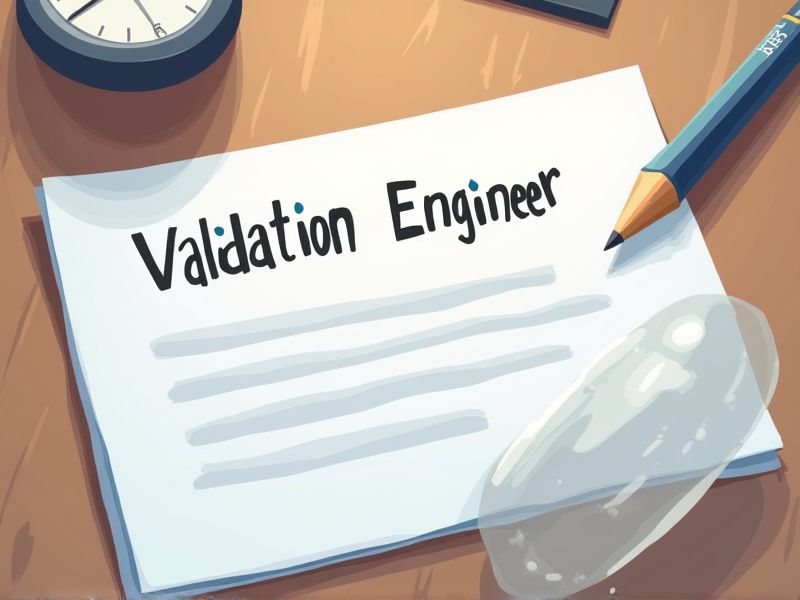
Validation Engineers ensure that products and systems meet rigorous quality standards, and certain certifications guarantee their proficiency in this arena. Certifications validate an engineer's competence in industry-specific protocols, ensuring compliance with regulatory requirements. Without these credentials, engineers may struggle to deliver consistent results, impacting product reliability and safety. Key certifications for a Validation Engineer include those that address industry regulations and technical competencies.
ASQ Certified Quality Engineer (CQE)
The requirement for an ASQ Certified Quality Engineer (CQE) credential in a Validation Engineer stems from the need to ensure product and process excellence by using statistical and quality management tools effectively. Mastery of these tools helps Validation Engineers identify, monitor, and remedy process deficiencies, thus ensuring compliance with regulatory and industry standards. Understanding quality principles and methodologies enhances a Validation Engineer's capability to validate processes accurately, leading to reduced risks and operational inefficiency. The certification signifies a comprehensive grasp on both quantitative problem-solving and risk management, crucial for sustaining high standards in complex validation tasks.
ASQ Certified Reliability Engineer (CRE)
ASQ Certified Reliability Engineer (CRE) provides essential knowledge in reliability engineering principles, which enhances the ability of a Validation Engineer to ensure product durability and performance. Understanding statistical reliability methods allows Validation Engineers to design and evaluate tests that accurately predict real-world product longevity. These skills reduce unexpected failures and costly recalls, promoting a more efficient validation process. Enhanced reliability insight translates into higher customer satisfaction and trust in the validated products.
Six Sigma Green Belt Certification
Possessing a Six Sigma Green Belt Certification equips a Validation Engineer with advanced problem-solving skills, crucial for identifying and eliminating inefficiencies in processes. The certification demonstrates a solid grasp of quality management and analytical techniques, enhancing the engineer's capability to ensure product compliance with industry standards. As companies aim for operational excellence, a Validation Engineer with Six Sigma expertise supports continuous improvement, leading to increased reliability and reduced costs. Employers in competitive industries value certified engineers, contributing to career advancement opportunities.
Six Sigma Black Belt Certification
Obtaining a Six Sigma Black Belt Certification equips a Validation Engineer with advanced problem-solving skills crucial for quality assurance. The certification's focus on statistical analysis enables engineers to identify process inefficiencies and reduce defects in product development. This credential demonstrates a commitment to continuous improvement, enhancing the credibility of the engineer among peers and within the industry. Employers often prefer or require this certification as it signifies a level of expertise conducive to optimizing complicated validation processes.
Project Management Professional (PMP)
Achieving a Project Management Professional (PMP) certification for a Validation Engineer enhances their ability to effectively oversee the planning and execution of complex validation protocols. It facilitates improved coordination among cross-functional teams, which is crucial for maintaining compliance in regulated industries. PMP training equips validation engineers with structured methodologies to efficiently allocate resources and manage timelines. This leads to reduced project delays and cost overruns by minimizing risks through effective project oversight and strategic decision-making.
FDA Regulatory Affairs Certification (RAC)
Validation Engineers often work within regulated industries, such as pharmaceuticals or medical devices, where compliance with FDA guidelines is crucial. Having an FDA Regulatory Affairs Certification (RAC) equips them with the necessary understanding of these complex regulations. This certification enhances their ability to ensure that products meet safety and efficacy standards, which can prevent costly compliance issues. An RAC can also increase a Validation Engineer's credibility and career opportunities within the industry.
ISO 13485 Lead Auditor Certification
ISO 13485 Lead Auditor Certification equips a Validation Engineer with a deep understanding of quality management systems, crucial for ensuring medical device compliance with international standards. It enhances the ability to conduct effective audits, which helps identify process gaps and improve product quality. Possessing this certification often increases professional credibility and career advancement opportunities within the medical device industry. Familiarity with ISO 13485 standards ensures that the engineer can contribute to safer and more efficient medical device development processes.
ISO 9001 Lead Auditor Certification
The ISO 9001 Lead Auditor Certification equips a Validation Engineer with a comprehensive understanding of quality management systems, ensuring adherence to critical industry standards. This certification enhances the ability to systematically evaluate processes, leading to improved validation procedures and consistent quality outcomes. The skills gained from being a certified lead auditor enable engineers to identify inefficiencies and initiate data-driven improvements. Organizations perceive certified professionals as assets, which may enhance career prospects and open opportunities for leadership roles.
Certified Calibration Technician (CCT)
A CCT provides precise measurements that are essential for validation engineers to ensure equipment operates within specified parameters. Accurate calibrations reduce errors in data collection, enhancing the reliability and safety of engineering processes. This alignment with standards boosts quality control and regulatory compliance, minimizing potential legal and operational risks. Employing a CCT also optimizes maintenance schedules, leading to cost efficiency and extended equipment lifespan.
Certified Risk Management Professional (CRMP)
Validation engineers often work in environments where identifying and mitigating risks is crucial, especially in sectors like pharmaceuticals or manufacturing. A Certified Risk Management Professional (CRMP) helps these engineers systematically assess potential risks and establish controls to prevent costly errors. CRMP training equips professionals with strategies to manage uncertainties effectively, enhancing the reliability of validation processes. Addressing risks early can lead to improved compliance with regulations and ensure product quality and safety.
Summary
When you, as a Validation Engineer, obtain relevant certifications, you can expect enhanced job prospects and opportunities for career advancement. Certifications validate your expertise, making you more attractive to employers and potentially leading to higher salary offers. Having certifications often equips you with updated industry knowledge, which can increase your efficiency and effectiveness in project execution. Your credibility within the industry grows, potentially opening doors to leadership roles or specialized positions in complex projects.
